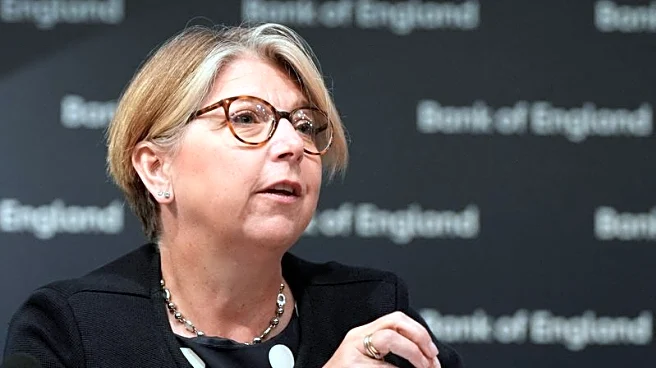By Phoebe Seers and Tommy Reggiori Wilkes
LONDON (Reuters) -Bank of England Deputy Governor Sarah Breeden on Tuesday warned that further diluting rules for stablecoins risked endangering financial stability
and causing a credit crunch, and said that the UK needed a different approach to the United States.
The Bank of England on Monday set out a raft of new rules for systemic stablecoins - digital tokens designed to keep a constant value - used for payments. It marked a softening of its earlier approach, but the crypto industry said did not go far enough and could inhibit the growth of stablecoins in Britain.
Those rules include limiting stablecoin holdings to 20,000 pounds ($26,840) per person - which no other major jurisdiction does - and requiring stablecoin issuers to hold 40% of the assets backing the coins with the BoE, where they would be unrenumerated.
NEW RULES GROUNDED IN PAST STRESS EVENTS
In an interview with Reuters, Breeden said the 40% figure was "grounded" in past stress events when depositors and coinholders ran for the exit, such as the 2023 collapse of Silicon Valley Bank and when the USDC stablecoin, issued by Circle, lost its dollar peg.
"Look at what happened with SVB, with Circle – those numbers are broadly in line with that. That’s why we’re proposing 40% rather than a smaller number," she said.
Breeden also defended the 20,000 pound limit for individuals 10 million pounds for most companies, saying they would be temporary and "halve the stress" on banks and credit creation caused by customers withdrawing bank deposits to buy stablecoins.
Whereas the U.S. has a much larger, more liquid market for non-bank finance, about 85% of mortgages and other consumer borrowing comes from bank finance in Britain, Breeden noted.
DIFFERENT SET OF RISKS IN UK VS US
"We have a different set of risks to manage as we transition to bringing in this new form of money," Breeden said.
The United States' embrace of cryptocurrencies under President Donald Trump is forcing other countries to assess if they remain competitive.
Breeden declined to elaborate on when caps would be lifted, but said that if stablecoins gain traction, the BoE would expect banks to adapt and develop wholesale funding sources to replace lost deposits.
The BoE’s latest proposals mark a shift from a 2023 plan that would have required issuers to hold 100% of backing assets as unremunerated deposits at the central bank, which the industry said would have made the stablecoin sector unviable.
The industry on Monday indicated it would push the BoE to further soften the latest proposals.
($1 = 0.7451 pounds)
(Reporting by Phoebe Seers and Tommy Reggiori Wilkes; Editing by Conor Humphries)











